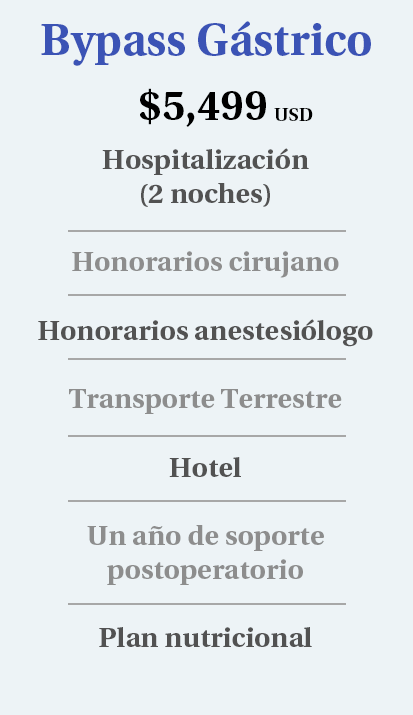
Cirujanos bariátricos certificados en Tijuana, México.
¿Que es el Bypass Gástrico?
El Bypass Gástrico (Roux-en-Y, pronunciado roo-en-why) es un tipo de cirugía bariátrica malabsortiva. Se crea una pequeña bolsa estomacal en la parte superior del estómago, y luego el cirujano crea un bypass para los alimentos. Este bypass permite que la comida evite la mayor parte del estómago excluido y la primera parte del intestino delgado, lo que limita la absorción de calorías. La pérdida de peso se logra al absorber menos cantidad de los alimentos consumidos. El Bypass Gástrico se utiliza a menudo como un método para tratar la obesidad mórbida, la diabetes tipo 2, la presión arterial alta, la apnea del sueño, otras comorbilidades o una cirugía previa de pérdida de peso fallida.

¿Soy candidata(o) a Cirugía de Bypass Gástrico?
The first step to determine if you are a good candidate for a Gastric Bypass is getting in touch with one of our patients coordinators to fill a quick Cuestionario Médico. Within 24 hours after receiving your information, one of our bariatric surgeons reviews your case and determines if you are a good candidate for Gastric Bypass Surgery.
Para ser considerada(o) para una cirugía de Baipás Gástrico, la mayoría de los paciente deben cumplir con el siguiente criterio:
1. Tener entre 18 y 65 años.
2. Tener una expectiva realista de la cirugía.
Necesitas un IMC superior a 30 o tener comorbilidades.
Beneficios Bypass Gástrico
La cirugía de Bypass Gástrico es una de las cirugías de pérdida de peso más efectivas (con un promedio de pérdida del 70-80% del exceso de peso) dentro de los primeros dos años. Es el estándar de oro en la cirugía bariátrica. Entre sus beneficios se pueden considerar:
- No podrás comer grandes porciones de comida.
- Síndrome de dumping, lo que significa que te sentirás mal si consumes demasiados carbohidratos o azúcar.
- Se absorben menos calorías de los alimentos.
- Después de la cirugía de Bypass Gástrico, los pacientes muestran mejoría en la diabetes.
Información sobre la Operación
Duración: 3-4 hours
Hospitalización: 1-2 days
Período de Recuperación: 2 weeks
Anestesia: General Anesthesia
Testimonios de Pacientes
Preguntas Frecuetes Bypass Gástrico
Para programar una consulta con My New Body – Obesity Center en Arizona, llámanos al 1 1(520) 390-4105 o completa nuestro formulario en línea >.
Se refiere a la forma de "Y" de la conexión del intestino delgado. Durante la operación, el intestino delgado se corta y luego se reconecta en un extremo al nuevo reservorio (el nuevo estómago), donde ahora recibirá los alimentos que han sido masticados y tragados. Ninguna parte del intestino se elimina durante la cirugía. La nueva conexión entre el reservorio estomacal y el intestino delgado se llama anastomosis. Esta abertura estrecha ayuda a restringir el paso de los alimentos que se mueven desde el reservorio hacia esta parte del intestino delgado, llamada rama Roux (en honor a un cirujano francés, Roux). La rama Roux es el brazo derecho de la "Y". El brazo izquierdo de la "Y" es la parte del intestino que sigue conectada al estómago excluido. Transporta los ácidos producidos en el resto del estómago, los jugos digestivos producidos por el hígado y el páncreas, incluida la insulina, y algunos jugos producidos por el propio intestino delgado. Los dos brazos de la "Y" se vuelven a conectar.
Se espera que pierdas un porcentaje de tu exceso de peso, pero solo unos pocos pacientes pierden el 100% de su exceso de peso y alcanzan un número establecido en una tabla de peso, la mayoría de las cuales han sido desarrolladas por un actuario (un especialista en estadísticas) empleado por una compañía de seguros de vida. Ese peso ideal podría tener poco que ver con tu mejor peso, donde te sientes y funcionas en óptimas condiciones de salud. Cuando has estado cargando exceso de peso durante mucho tiempo, tu estructura ósea y masa muscular también habrán necesitado aumentar para soportar ese exceso de peso. Las tablas de peso estándar no reflejan esto. La mayoría de los pacientes pierden entre el 60% y 70% de su exceso de peso durante el primer año después de la cirugía.
Resultados





